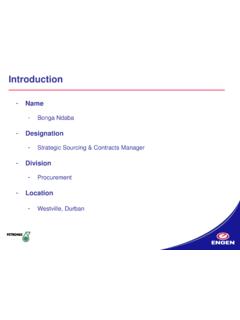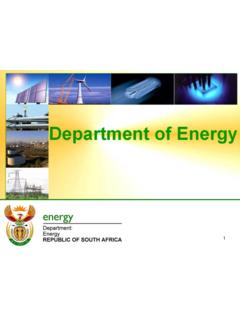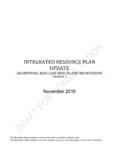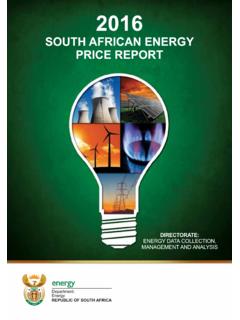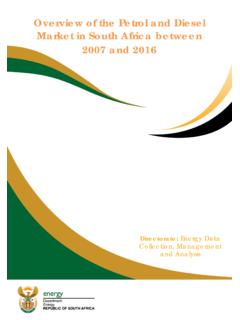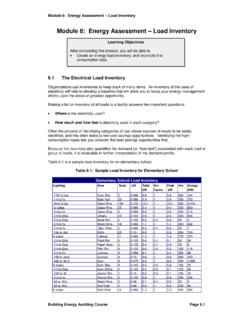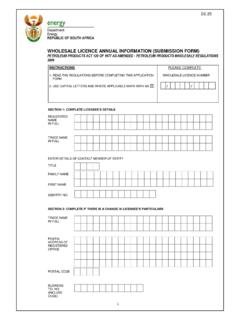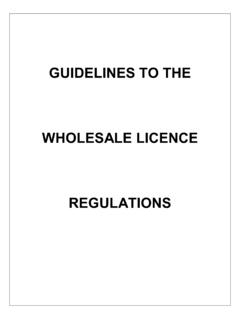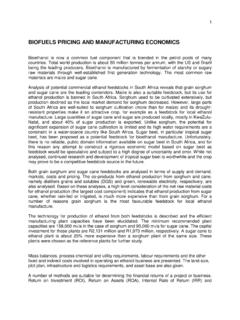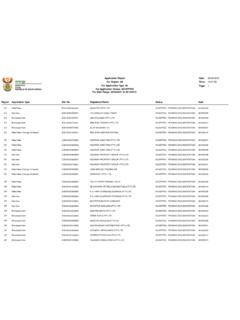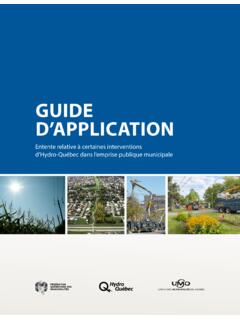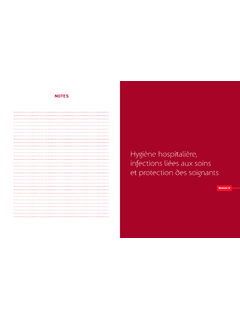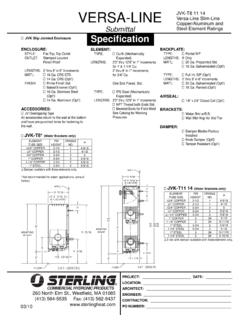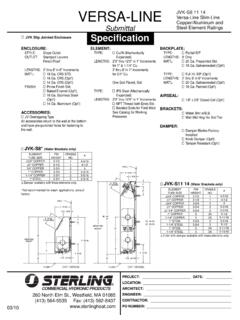Transcription of DRAFT INTEGRATED ENERGY PLANNING REPORT
1 DRAFT INTEGRATED ENERGY PLANNING REPORT . OVERVIEW OF INTEGRATED ENERGY . PLANNING APPROACH. Ms Tshilidzi Ramuedzisi Chief Director: ENERGY PLANNING 2 DRAFT INTEGRATED ENERGY PLANNING REPORT . CONTENTS. PURPOSE AND OBJECTIVES. HIGH-LEVEL PLANNING APPROACH. IEP CONTEXT (KEY POLICY ISSUES). BASE CASE AND TEST CASES. WAY FORWARD. 3 DRAFT INTEGRATED ENERGY PLANNING REPORT . ENERGY VALUE CHAIN. INTEGRATED ENERGY PLANNING seeks to consider all the key elements of the ENERGY value-chain at a national level PRIMARY SECONDARY DEMAND FOR. CONVERSION END-USE. ENERGY / ENERGY ENERGY . TECHNOLOGIES TECHNOLOGIES. RESOURCES CARRIERS SERVICES. RENEWABLES POWER Electricity INDUSTRY INDUSTRIAL. Solar GENERATION Heat Steam boilers SECTOR. Wind Conventional Coal Refined Petroleum Furnace Process Steam Biomass Plant Products Machinery Motive Power hydro Nuclear COMMERCE COMMERCIAL.
2 CCGT Air Conditioning SECTOR. FOSSIL FUELS OCGT Light Bulbs Electronic Solar Communication Coal HOUSEHOLDS. Wind Cooling Crude Oil Space Heaters RESIDENTIAL. Natural Gas Refrigerators SECTOR. Stoves FUEL PROCESSING Space Heat NUCLEAR FUELS Geysers Oil refineries Refrigeration Uranium AGRICULTURE. GTL Cooking Irrigation pumps CTL Hot water Resources TRANSPORT. AGRICULTURAL. extraction and Vehicles SECTOR. sourcing REGASIFICATION Aircraft Water supply Rail TRANSPORT. SECTOR. Person kms 4 DRAFT INTEGRATED ENERGY PLANNING REPORT . PURPOSE AND OBJECTIVES. The IEP is a multi-faceted policy which has multiple objectives: Describes the recommended ENERGY PATHWAY/ ENERGY . SECTOR ROADMAP for South Africa Guides the development of ENERGY policies and where relevant set the framework for regulations in the ENERGY sector Guides the selection of appropriate technology to meet ENERGY demand ( what types and size of new power plants and refineries should be built and what prices should be charged for fuels).
3 It therefore also guides the investment and development of ENERGY infrastructure in South Africa Proposes alternative ENERGY strategies which are informed by testing the potential impacts of exogenous factors 5 DRAFT INTEGRATED ENERGY PLANNING REPORT . KEY QUESTIONS. Between now and What is the desired economic growth and socio-economic needs of the country? ENERGY Demand: What will be the ENERGY requirements to support this economic growth and socio-economic development? ENERGY Efficiency and Demand Side Interventions: Is there a way in which we can reduce these ENERGY requirements without stifling the desired economic growth and socio- economic development? ENERGY Access: What are the full ENERGY requirements (not just on-grid electricity) for all people? What strategies need to be put in place to ensure that there is universal access? 6 DRAFT INTEGRATED ENERGY PLANNING REPORT .
4 KEY QUESTIONS. Between now and Security of Supply: What supply options do we need to put in place to ensure that we don't suffer a supply deficit? What new technologies and feedstock combinations should we consider? Minimise costs: How much do different technologies cost and what will the costs be in the future? Diversity of Supply Sources: Where should the feedstock come from and what will the costs of the feedstock be? Diversity of Supply: Primary Resources How do we exploit our natural endowment while minimising overreliance on a single source 7 DRAFT INTEGRATED ENERGY PLANNING REPORT . KEY QUESTIONS. Between now and Environmental impact: How do we ensure that we do not make choices which create additional pressure on the environment in the future Minimise the water requirements of the chosen technologies Minimise emissions associated with technologies and primary ENERGY resources 8 DRAFT INTEGRATED ENERGY PLANNING REPORT .
5 KEY QUESTIONS. Between now and Localisation and technology transfer: In recommending these supply-side options/technologies, how do we ensure that local players can participate? What is the employment-intensity of ENERGY production for these technologies and what strategies should be considered to ensure an increase in the employment-intensity of the ENERGY sector? What level of regulation and market structure will optimise this? 9 DRAFT INTEGRATED ENERGY PLANNING REPORT . 8 KEY OBJECTIVES. SECURITY OF. SUPPLY. WATER USAGE COST OF. ENERGY . ENVIRONMENTAL SOCIO-ECONOMIC. SUSTAINABILITY DEVELOPMENT ACCESS TO. EMISSIONS. ENERGY . ECONOMIC. GROWTH. DIVERSITY OF. SUPPLY LOCALISATION. ENERGY . EFFICIENCY. 10 DRAFT INTEGRATED ENERGY PLANNING REPORT . CONTENTS. PURPOSE AND OBJECTIVES. HIGH-LEVEL PLANNING APPROACH. IEP CONTEXT (KEY POLICY ISSUES). BASE CASE AND TEST CASES.
6 WAY FORWARD. 11 DRAFT INTEGRATED ENERGY PLANNING REPORT . HIGH-LEVEL ENERGY PLANNING PROCESS. I. Define ENERGY PLANNING is iterative objectives and The scope of the IEP development problem process is encompassed in Steps I, II. statement II. Define and III. VI. Review and and evaluate Steps IV, V, and VI are within the enhance options broader scope of the IEP process, but fall outside the sphere of its development Once the IEP recommendations have V. been made and promulgated, Implement III. Make and recommen- implementation, monitoring and monitor dations review of those recommendations progress need to take place IV. Develop The outcomes from these steps must action plan inform future iterations of the IEP. 12 DRAFT INTEGRATED ENERGY PLANNING REPORT . HIGH-LEVEL APPROACH. I. DEFINE PROBLEM STATEMENT II. DEFINE AND ANALYSE III. MAKE. AND OBJECTIVES OPTIONS RECOMMENDATIONS.
7 Define problem statement and Identify policy alternatives Evaluate policy alternatives key objectives Describe current state of ENERGY Analyse and present policy Make recommendations sector alternatives Define key policy questions 13 DRAFT INTEGRATED ENERGY PLANNING REPORT . The chosen approach enables for: HIGH-LEVEL APPROACH. 1) Combination of Quantitative (data-driven) and Qualitative (expert judgement) analysis 2) A parallel consideration of each of the following elements: Existing and future ENERGY technologies and ENERGY carriers Existing and proposed policies with a significant impact on the ENERGY sector Other socio-economic factors which need to be considered Objectives upon which different options should be evaluated Technologies, ENERGY . Reference EVALUATE MODEL OUTPUT AND POLICY PROPOSALS. ENERGY MODELS. ENERGY Carriers, ( ENERGY RESOURCES AND.
8 System TECHNOLOGY OPTIONS). ENERGY += Base MODEL OUTPUT. Services Case (Multi-Criteria Decision Analysis). Supply Optimisation RECOMMENDATIONS. Existing High-Impact Policies Demand New/Proposed High-Impact Test Projections Policies Cases Other policy and socio- economic factors Key Objectives (Criteria for Policy Analysis). 14. CONTENTS. PURPOSE AND OBJECTIVES. HIGH-LEVEL PLANNING APPROACH. IEP CONTEXT (KEY POLICY ISSUES). BASE CASE AND TEST CASES. WAY FORWARD. 15 DRAFT INTEGRATED ENERGY PLANNING REPORT . IEP AND OTHER PLANS. INTEGRATED Resource Plan SECURITY OF. SUPPLY Informs Liquid Fuel Roadmap development of Renewable ENERGY future ENERGY Roadmap Sector Roadmaps DIVERSITY OF Provides feedback Coal Roadmap to external High- SUPPLY. Impact Policies Gas Masterplan ENERGY Efficiency Strategy DEMAND IEP. Electrification ACCESS. Roadmap - Water Constraints - Emissions Limits External High- - Alternative Supply Impact Policies Options - Economic Growth IEP takes into Demand Projections consideration existing 16 policies Supply DRAFTO ptimisation INTEGRATED ENERGY PLANNING REPORT .
9 HIGH-IMPACT POLICIES. NEW GROWTH PATH, NATIONAL DEVELOPMENT PLAN. National Transport Proposed Water INTEGRATED Climate Beneficiation Carbon Tax Infrastructure Strategy ENERGY Plan Plan Change Plan Policy Policy The IEP seeks to quantify and provide feedback on the extent to which national policy objectives outside the sector may impact on the attainment of ENERGY sector imperatives and vice versa 17 DRAFT INTEGRATED ENERGY PLANNING REPORT . HIGH-IMPACT POLICIES. OVERARCHING NATIONAL POLICIES WITH POLICIES WITH BIDIRECTIONAL. POLICIES UNIDIRECTIONAL IMPACT IMPACT. New Growth Path Proposed Carbon Tax Policy National Climate Change Sets aspirational targets for Proposes a carbon tax for Response White Paper employment, economic ENERGY supply and ENERGY Peak, Plateau, Decline . growth and green economy end-use amongst other emission reduction targets National Development Plan sectors have significant implications Defines alternatives that for the ENERGY sector should be considered for Beneficiation Strategy ensuring security of liquid Implementation of strategy fuel supply is met will affect demand profile of Alternative sources for industrial sector electricity generation Transport Plan National Treasury Modal shifts from passenger Economic Growth vehicles to mass transit, Projections from road to rail, amongst others have implications on future ENERGY requirements transport from the sector 18 DRAFT INTEGRATED ENERGY PLANNING REPORT .
10 KEY POLICY ISSUES. HIGH-IMPACT POLICIES KEY POLICY ISSUES TEST CASES. National Climate Change Response White Paper Peak-Plateau-Decline' Emissions Climate Change and Limit Case Proposed Carbon Tax Policy Emission Reductions Carbon Tax Case Renewable ENERGY White Paper The role of Renewable ENERGY Technologies in Renewable ENERGY Target Case moving towards a low- carbon economy Role of Alternative Emissions Limit - No New Nuclear Supply Options such as Case National Development Plan Nuclear and Natural Emissions Limit - Natural Gas Case Gas Liquid Fuels Supply Options under High Oil Price Case different crude oil Low Oil Price Case price scenarios 19 DRAFT INTEGRATED ENERGY PLANNING REPORT . CONTENTS. PURPOSE AND OBJECTIVES. HIGH-LEVEL PLANNING APPROACH. IEP CONTEXT (KEY POLICY ISSUES). BASE CASE AND TEST CASES. WAY FORWARD. 20 DRAFT INTEGRATED ENERGY PLANNING REPORT .
